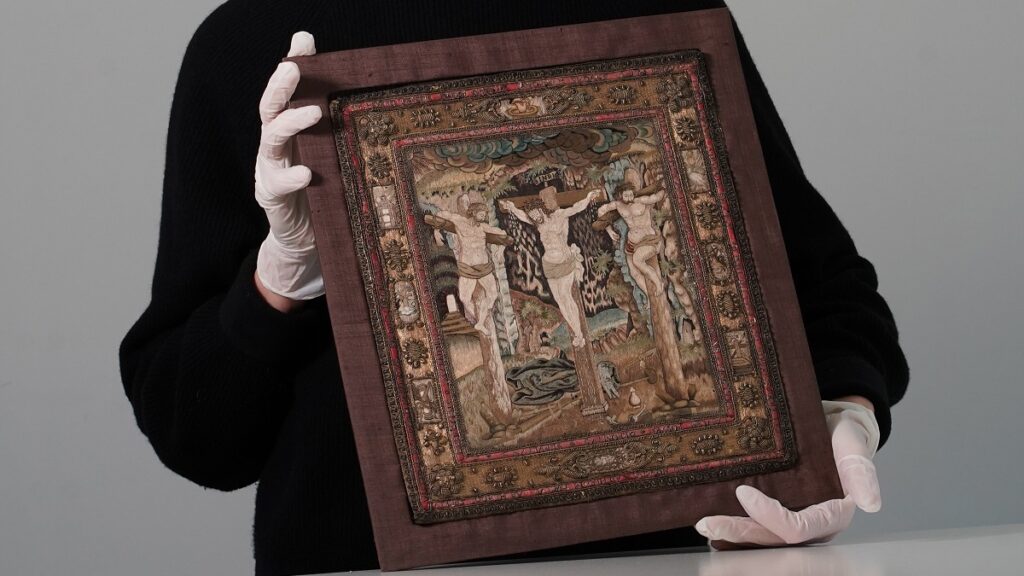A RARE embroidery dating back to the early seventeenth century has been acquired by National Museums Scotland.
The textile has been acquired with the support of textile collector and philanthropist Leslie B. Durst and coincides with the announcement of three textile conservation internships in her name.
The embroidered crucifixion is a unique surviving example of textiles associated with catholic devotion.
Few such objects survive in Britain, most were destroyed due to fears of idolatrous worship.
At the time, the practice of Catholicism was punishable by imprisonment or worse.

Created by skilled artisans, the crucifixion is illustrated in coloured skills and surrounded by a Latin prayer embroidered with gold and silver thread.
The textile was originally owned by Elizabeth Stuart, a member of the Scottish nobility, who married into one of the most prominent Catholic families in Britain.
It has remained in the collection of the Howards, Earls of Arundel and Dukes of Norfolk since the 17th century.
An inscription on the back of the piece suggests that the family once believed it belonged to Mary Queen of Scots, but this has since been disproven.
Helen Wyld, Senior Curator of Historic Textiles at National Museums Scotland said: “It is very unusual for textiles of this kind and quality to survive in the UK, and even more so with such a compelling provenance.
“The Crucifixion can help us better understand the role of textiles in Catholic devotion in England and Scotland.
“Its history in the collections of Elizabeth Stuart and the Howard family sheds light on a forgotten aspect of Scotland’s past and provides insight into the lives of those who treasured it for centuries.
“Thanks to the generosity and support of Leslie B. Durst, this remarkable object will be secured for the nation for years to come.”
The exceptional condition of the piece suggests that it was treasured by successive generations.
National Museums Scotland is undertaking minor conservation work to ensure that it’s ready for display as well as technical analysis to learn more about its construction.
Starting this autumn, the Leslie B. Durst textile conservation internships in partnership with the Clothworkers Company, have been created for early career textile conservators.
Based within the National Museums Scotland’s state of the art collection centre, three paid interns will be supported by a dedicated team of highly skilled experts working on a varied programme of high-profile conservation projects.
These roles represent a critical investment in the future of the sector, ensuring specialist skills and knowledge are passed to future generations.
Lynn McClean, Principal Conservator at National Museums Scotland, said: “These internships will help safeguard Scotland’s irreplaceable textile heritage and the highly skilled profession of textile conservation.
“The support of Leslie B. Durst and the Clothworkers Company have allowed us to offer these career-defining opportunities and we are delighted to welcome three new conservators to our team.”
Recruitment for the first paid, one-year internship will start this summer with an anticipated start date in October 2022. Further one-year positions will begin in 2023 and 2024.

